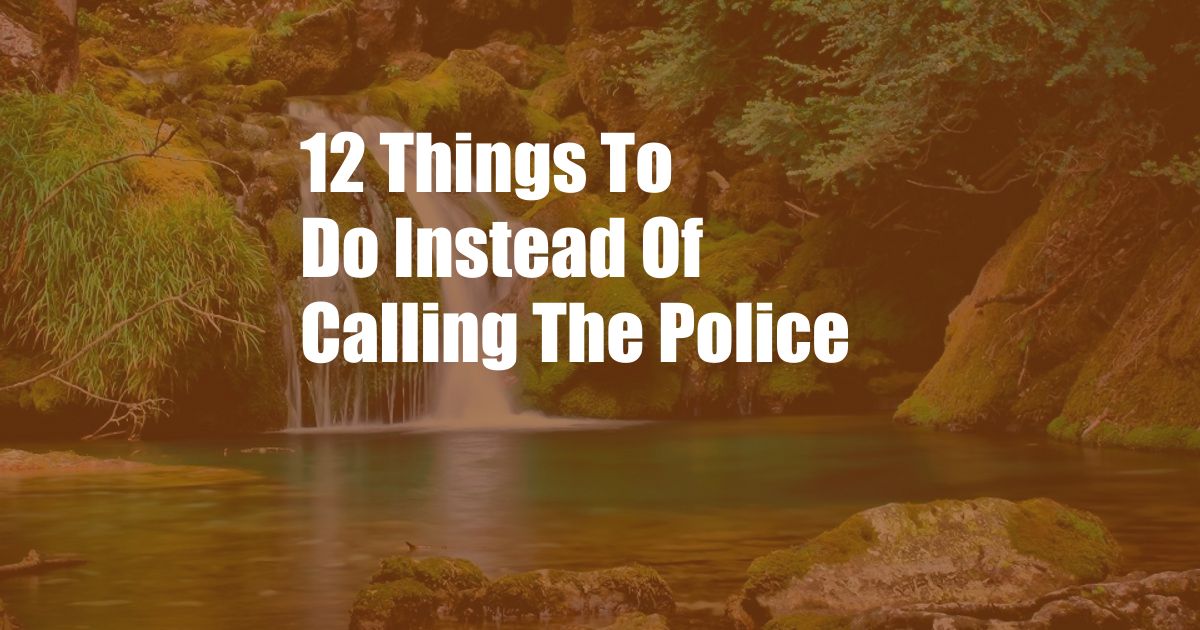
12 Things To Do Instead of Calling the Police
In the wake of recent events, there has been a growing movement to reform the police and reduce their role in our communities. While there is still a lot of work to be done, there are many things we can do right now to reduce our reliance on the police and create a more just and equitable society.
One of the most important things we can do is to learn how to de-escalate situations without resorting to violence. This means learning how to communicate effectively, how to set boundaries, and how to walk away from conflicts. There are many resources available to help us learn these skills, such as the website of the National Conflict Resolution Center.
Call a Crisis Hotline
If you are in a situation where you feel unsafe, but you don’t think the police are the best option, there are many other resources available to you. You can call a crisis hotline, such as the National Suicide Prevention Lifeline (1-800-273-8255) or the Crisis Text Line (text HOME to 741741). These hotlines are staffed by trained professionals who can provide support and resources. They can also help you to develop a safety plan if you are in danger.
If you are experiencing a mental health crisis, you can also call the National Alliance on Mental Illness (NAMI) HelpLine (1-800-950-NAMI). NAMI provides support and resources for people with mental illness and their families. They can also help you to find a therapist or other mental health professional.
Contact a Community Mediator
If you are having a conflict with a neighbor, family member, or other community member, you can contact a community mediator. Community mediators are trained to help people resolve conflicts peacefully and respectfully. They can help you to communicate more effectively, set boundaries, and find solutions that work for everyone involved. To find a community mediator in your area, you can visit the website of the National Association for Community Mediation.
File a Complaint with the Police Department
If you have had a negative experience with the police, you can file a complaint with the police department. You can do this in person, by mail, or online. The complaint process can be long and frustrating, but it is an important way to hold the police accountable for their actions.
To file a complaint, you will need to provide the following information:
- Your name and contact information
- The date and time of the incident
- The location of the incident
- The names of the officers involved
- A description of what happened
- Any witnesses to the incident
Once you have filed a complaint, the police department will investigate the matter. They will interview you and any witnesses, and they will review any available evidence. The investigation may take several weeks or even months. If the police department finds that there was misconduct, they may take disciplinary action against the officers involved.
Attend a Community Meeting
One of the best ways to learn about the police in your community is to attend a community meeting. These meetings are typically held by the police department or by a community organization. They provide an opportunity for residents to ask questions and voice their concerns. You can also learn about the police department’s policies and procedures. To find out when and where community meetings are being held, you can check the website of the police department or contact your local community organization.
Get Involved in Local Politics
One of the most effective ways to change the police is to get involved in local politics. You can run for office yourself, or you can support candidates who share your views. You can also volunteer for campaigns, donate money, or simply spread the word about the issues that are important to you. By getting involved in local politics, you can help to shape the future of your community, including the role of the police.
FAQ
Q: What should I do if I see someone being harassed by the police?
A: If you see someone being harassed by the police, there are several things you can do.
- Stay calm and assess the situation. Make sure it is safe to intervene.
- If you feel comfortable, approach the person being harassed and ask if they need help.
- If the person says yes, you can try to de-escalate the situation by talking to the police officers and explaining that the person being harassed is not doing anything wrong.
- If you are unable to de-escalate the situation, you can call 911 and report the harassment.
Q: What should I do if I am pulled over by the police?
A: If you are pulled over by the police, here are some tips to keep in mind:
- Stay calm and be polite. Do not argue with the officer.
- Pull over to the side of the road and turn off your engine.
- Keep your hands visible on the steering wheel.
- If the officer asks you to step out of the vehicle, do so calmly and slowly.
- Answer the officer’s questions honestly and respectfully.
- If you do not understand something, ask the officer to explain it to you.
- Do not consent to any searches without a warrant.
- If you are arrested, do not resist. Ask for a lawyer as soon as possible.
Conclusion
There are many things we can do instead of calling the police. By learning how to de-escalate situations, we can reduce the need for police intervention. We can also support community-based alternatives to policing, such as crisis hotlines, community mediators, and restorative justice programs. By getting involved in local politics, we can help to create a more just and equitable society.
Are you interested in learning more about the topic?